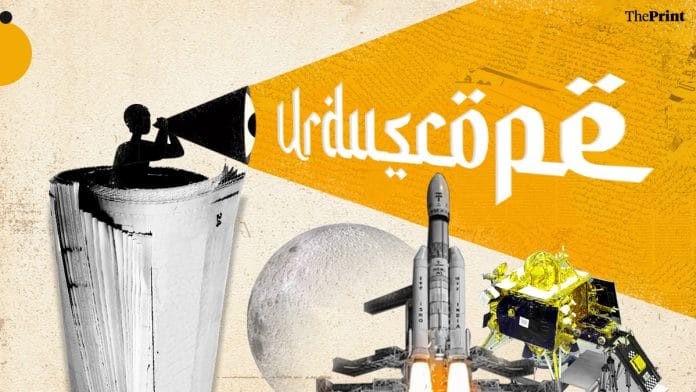New Delhi: The suspense and the subsequent euphoria over Indian lunar mission Chandrayaan-3’s soft-landing near the south pole of the Moon kept the Urdu press abuzz all of this week.
In its editorial on 25 August, Siasat said that not only did Chandrayaan-3 pave the way for future missions but it has also “raised the hopes that India can reach places that no other country has gone” thanks to Indian scientists.
“The success of the Chandrayaan-3 mission is a proud moment and every Indian should be proud of it,” the editorial added.
Chandrayaan-3 successfully soft-landed near the Moon’s south pole on 23 August, a first for any country. The feat is a major boost for the Indian Space Research Organisation (ISRO), which has been working on lunar missions since 2019.
Gazing earthwards, Urdu papers also covered the Congress’s preparations for the upcoming assembly elections in various states and Prime Minister Narendra Modi’s participation in the BRICS summit in South Africa earlier this week.
Here’s a roundup of all the news that took centre-stage in the front pages and editorials of the Urdu press this week.
Also Read: ‘India don dey Moon now’: How world media reported Chandrayaan-3, from Pidgin to Queen’s English
Chandrayaan-3
Much like the rest of the Indian media, all three Urdu newspapers — Inquilab, Siasat, and Roznama Rashtriya Sahara — covered the progress of Chandrayaan-3 this week.
The south pole of the Moon — the region where Chandrayaan-3’s Vikram Lander landed this week — has long held the interest of astronomers because of the presence of water ice.
In an editorial on 22 August, a day before the landing, Sahara mused that the success of the lunar mission could pave the way for the discovery of new worlds. The newspaper speculated that if the hunt for water ice is successful, humans would be one step closer to realising the dream of establishing settlements on the Moon.
In an editorial on 25 August, Inquilab said that China, America, and the former Soviet Union had all landed on the Moon, but India’s success was extraordinary in many ways and the envy of many a nation. “The flag is flying high,” the editorial said.
All three Urdu newspapers celebrated India’s successful landing on their front pages, also carrying statements by ISRO’s chief S. Somanath, India’s President Droupadi Murmu, Prime Minister Narendra Modi, and Congress president Mallikarjun Kharge. The newspapers also carried NASA Administrator Bill Nelson’s statement that the US space agency was “happy to partner” with ISRO on the mission.
Congress and caste census
The Urdu press gave prominent coverage to the Congress — from the appointment of its new UP president Ajay Rai, to the party’s preparations for assembly elections in Chhattisgarh, Rajasthan, Madhya Pradesh, Telangana, and Mizoram.
While the Congress is looking to retain power in Rajasthan and Chhattisgarh, it’s currently in the opposition in the other states.
Particular coverage was given to Congress president Mallikarjun Kharge’s promise, at an election rally on 23 August, of a caste census in Madhya Pradesh if it came to power.
In an editorial on 24 August, Inquilab said that while India’s Other Backward Classes (OBC) reservation stood at 27 percent, the Mandal Commission report estimated that OBCs make up 52 percent of the country’s population.
“If this 52 percent is accepted as correct then OBC reservation should also be 52 percent but it’s only 27 percent i.e. almost half,” the editorial said. “That’s why the government is afraid — as soon as the caste perception is confirmed, the OBCs of the country will start demanding that they should be given reservation proportional to their population.”
BRICS summit
Prime Minister Narendra Modi’s visit to Johannesburg, South Africa, for the BRICS Summit was widely covered in the Urdu press, both on the front pages and in editorials.
In an editorial on 23 August, Sahara wrote a critical piece in which it castigated the central government’s perception of economic stability and prosperity. These concepts, the editorial claimed, are nothing more than a mere fantasy for a country where one-third of the population doesn’t get food twice a day.
“Development and prosperity of a country depends on the income of the people of that country rather than its rising economic image,” the editorial said, adding that India still has miles to go.
(Edited by Uttara Ramaswamy)
Also Read: ‘Helped restore faith in democracy’ — Urdu press hails Rahul Gandhi’s return to Parliament






